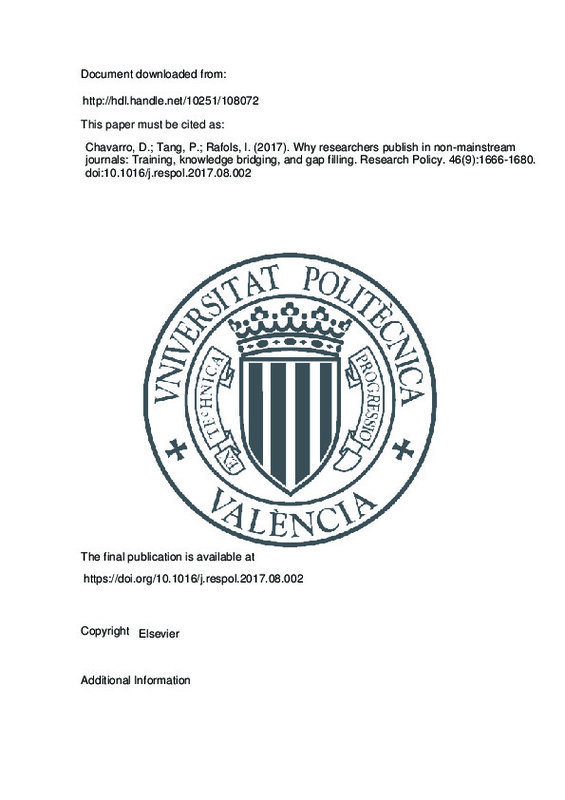|
Resumen:
|
[EN] In many countries research evaluations confer high importance to mainstream journals, which are considered to publish excellent research. Accordingly, research evaluation policies discourage publications in other ...[+]
[EN] In many countries research evaluations confer high importance to mainstream journals, which are considered to publish excellent research. Accordingly, research evaluation policies discourage publications in other non-mainstream journals under the assumption that they publish low quality research. This approach has prompted a policy debate in low and middle-income countries, which face financial and linguistic barriers to access mainstream journals. A common criticism of the current evaluation practices is that they can hinder the development of certain topics that are not published in mainstream journals although some of them might be of high local relevance. In this article, we examine this issue by exploring the functions of non-mainstream journals in scientific communication. We interviewed researchers from agricultural sciences, business and management, and chemistry in Colombia on their reasons to publish in non-mainstream journals. We found that non-mainstream journals serve the following functions: 1) offer a space for initiation into publishing (training); 2) provide a link between articles in mainstream journals and articles read by communities with limited access to them (knowledge-bridging); 3) publish topics that are not well covered by mainstream journals (knowledge gap-filling). Therefore, publication in non-mainstream journals cannot be attributed only to `low scientific quality¿ research. They also fulfil specific communication functions. These results suggest that research evaluation policy in low and middle-income countries should consider assigning greater value to non-mainstream journals given their role in bridging and disseminating potentially useful and novel knowledge.
[-]
|
|
Agradecimientos:
|
We are grateful for the insightful comments of two Research Policy anonymous peer reviewers. We thank Ed Steinmueller, Ben Martin, Tomasso Ciarli, Saurabh Aurora, Andy Stirling, Matfas Ramirez, Roth) Alvarez, Tomas Saieg, ...[+]
We are grateful for the insightful comments of two Research Policy anonymous peer reviewers. We thank Ed Steinmueller, Ben Martin, Tomasso Ciarli, Saurabh Aurora, Andy Stirling, Matfas Ramirez, Roth) Alvarez, Tomas Saieg, Andrea Laplane, Edwin Cristancho and other colleagues at SPRU for many fruitful discussions. We also thank two SPRU Working Paper Series peer reviewers. We are also indebted to the interviewees that made this research possible for their time and invaluable help. Diego Chavarro was sponsored by Colciencias for his PhD at SPRU (University of Sussex) and also received a grant to conduct research in Colombia from the Doctoral School of the University of Sussex. The Facultad de Administracion de Empresas de la Universidad Externado de Colombia provided him facilities to do his fieldwork and guidance from Luis Antonio Orozco and Carlos Restrepo. In addition, EU-SPRI awarded him a grant to do a research visit at INGENIO (CSIC-UPV), Valencia, supervised by Jordi Molas Gallart. This paper would not have been possible without the support of these organisations and colleagues.
[-]
|







![[Cerrado]](/themes/UPV/images/candado.png)

